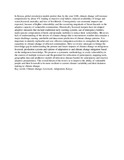Climate change vulnerability, adaptation and mitigation of livestock systems in Kenya

View/
Date
2012-04Author
Muchemi, G M
Thumbi, S M
Kiama, S G
Nanyingi, M O
Language
enMetadata
Show full item recordAbstract
In Kenya, global circulation models predict that, by the year 2100, climate change will increase
temperatures by about 4°C leading to massive crop failure, reduced availability of forage and water,livestock mortality and loss of livelihoods. Consequently vast economic impacts are expected, because of higher vulnerability and the exceeding magnitude of future hazards to the adaptive capacity of vulnerable communities. Historically livestock keepers have developed adaptive measures that include traditional early warning systems, use of emergency fodders, multi-species composition of herds and nomadic mobility to reduce their vulnerability. However, lack of understanding of the drivers of climate change due to inconsistent weather data remains a major challenge causing unreliable and inaccurate prediction of climate change patterns. It is important to identify replicable and cost effective mitigation activities to strengthen the adaptive capacities to climate change of affected communities. Here we review strategies to bridge the knowledge gap in understanding the present and future impacts of climate change on indigenous livestock production systems and options of adaptation to and climate change mitigation based on the indigenous knowledge. We propose a systematic methodology to study vulnerability in the context of multiple stressors and the potential for utilization of participatory mapping tools, geographic data and predictive models of infectious disease burden for anticipatory and reactive adaptive preparedness. The overall thrust of the review is to improve the ability of vulnerable people and their livestock to be more resilient to current climate variability and their decision-making to climate change.
Key words: Climate change; Livestock; Adaptation; Kenya
Citation
Presentation at The 46th Kenya Veterinary Association Annual Scientific Conference and The 12th World Veterinary Day Celebrations,2012Publisher
University Of Nairobi
